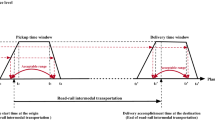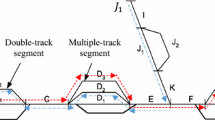Abstract
Severe weather conditions and inherent uncertainties in various components of railway traffic systems can lead to equipment breakdown and reduced capacity on tracks and stations. This paper formulates a two-stage fuzzy optimization model to obtain a robust rescheduling plan under irregular traffic conditions, and a scenario-based representation is adapted to characterize fuzzy recovery time durations on a double-track railway line. The model aims to minimize the expected total delay time in the rescheduled train schedule with respect to the original timetable. Two decomposed sub-models are further developed corresponding to the trains in different directions, and then GAMS optimization software is used to obtain the robust rescheduling plan. The numerical experiments demonstrate the effectiveness of the proposed approaches.








Similar content being viewed by others
References
Cacchiani V, Caprara A, Fischetti M (2012) A Lagrangian heuristic for robustness with an application to train timetabling. Transp Sci 144((1):65–73
Caprara A, Galli L, Kroon L, Maroti G, Toth P (2010) Robust Train routing and online re-scheduling. In: Proceedings of 10th workshop on algorithmic approaches for transportation modelling, optimization, and systems (ATMOS’10), pp 24–33
Dorfman MJ, Medanic J (2004) Scheduling trains on a railway network using a discrete event model of railway traffic. Transp Res B: Methodological 38((1):81–98
Fischetti M, Salvagnin D, Zanette A (2007) Fast approaches to robust railway timetabling. In: Proceedings of 7th workshop on algorithmic approaches for transportation modeling, optimization, and systems, pp 142–157
Gao J, Liu ZQ, Shen P (2009) On characterization of credibilistic equilibria of fuzzy-payoff two-player zero-sum game. Soft Comput 13(2):127–132
Gao J, Zhang Q, Shen P (2011) Coalitional game with fuzzy payoffs and credibilistic Shapley value. Iran J Fuzzy Syst 8(4):107–117
Ghoseiri K, Szidarovszky F, Asgharpour MJ (2004) A multi-objective train scheduling model and solution. Transp Res B: Methodological 38((10):927–952
Higgins A, Kozan E, Ferreira L (1996) Optimal scheduling of trains on a single line track. Transp Res B: Methodological 30(2):147–161
Higgins A, Kozan E, Ferreira L (1997) Modelling the number and location of siding on a single line railway. Comput Oper Res 24(3):209–220
Iida Y (1988) Timetable preparation by A.I. approach. In: Proceedings of European simulation multiconference, Nice, France, pp 163–168
Jovanovic D, Harker PT (1991) Tactical scheduling of rail operations: the SCAN I system. Transp Sci 25:46–64
Li F, Gao Z, Li K, Yang L (2008) Efficient scheduling of railway traffic based on global information of train. Transp Res B: Methodological 42:1008–1030
Li X, Ralescu D, Tang T (2011) Fuzzy train energy consumption minimization model and algorithm. Iranian J Fuzzy Syst 8(4):77–91
Li X, Chien C, Li L, Gao ZY, Yang L (2012a) Energy-constraint operation strategy for high-speed railway. Int J Innov Comput Inf Control 8(10):6569–6583
Li X, Wang D, Li K, Gao Z (2012b) A green train scheduling model and fuzzy multi-objective optimization algorithm. Appl Math Model. doi:10.1016/j.apm.2012.04.046
Liu B (2004) Uncertainty theory: an introduction to its axiomatic foundations. Springer, Berlin
Liu B, Liu YK (2002) Expected value of fuzzy variable and fuzzy expected value model. IEEE Trans Fuzzy Syst 10(4):445–450
Meng L, Zhou X (2011) Robust single-track train dispatching model under a dynamic and stochastic environment: a scenario-based rolling horizon solution approach. Transp Res B: Methodological 45:1080–1102
Nahmias S (1978) Fuzzy variable. Fuzzy Sets Syst 1:97–110
Sahin I (1999) Railway traffic control and train scheduling based on inter-train conflict management. Transp Res B: Methodological 33(7):511–534
Shen P, Gao J (2011) Coalitional game with fuzzy information and credibilistic core. Soft Comput 15(4):781–786
Yang L, Li K, Gao Z (2009) Train timetable problem on a single-line railway with fuzzy passenger demand. IEEE Trans Fuzzy Syst 17(3):617–629
Yang L, Gao Z, Li K (2010) Passenger train scheduling on single or partially double lines railway with stochastic information. Eng Optim 42:1003–1022
Yang L, Li X, Gao Z, Li K (2011a) A fuzzy minimum risk model for the railway transportation planning problem. Iranian J Fuzzy Syst 8:39–60
Yang L, Gao Z, Li K (2011b) Railway freight transportation planning with mixed uncertainty of randomness and fuzziness. Appl Soft Comput 11:778–792
Yang L, Li K, Gao Z, Li X (2012) Optimizing trains movement on a railway network. Omega: Int J Manag Sci 40:619–633
Zadeh LA (1965) Fuzzy sets. Inf Control 8:338–353
Zadeh LA (1978) Fuzzy sets as a basis for a theory possibility. Fuzzy Sets Syst 1:3–28
Zhou X, Zhong M (2007) Single-track train timetabling with guaranteed optimality: branch-and-bound algorithms with enhanced lower bounds. Transp Res B: Methodological 41(3):320–341
Acknowledgments
This research was supported by the National Natural Science Foundation of China (Nos. 70901006, 71271020), the Fundamental Research Funds for the Central Universities (No. 2011JBM158), Research Foundation of State Key Laboratory of Rail Traffic Control and Safety, Beijing Jiaotong University (Nos. RCS2011ZT008, RCS2009ZT001, RCS2010ZZ001) and Program for New Century Excellent Talents in University under Grant no. NCET-10-0218.
Author information
Authors and Affiliations
Corresponding author
Rights and permissions
About this article
Cite this article
Yang, L., Zhou, X. & Gao, Z. Rescheduling trains with scenario-based fuzzy recovery time representation on two-way double-track railways. Soft Comput 17, 605–616 (2013). https://doi.org/10.1007/s00500-012-0934-1
Published:
Issue Date:
DOI: https://doi.org/10.1007/s00500-012-0934-1




